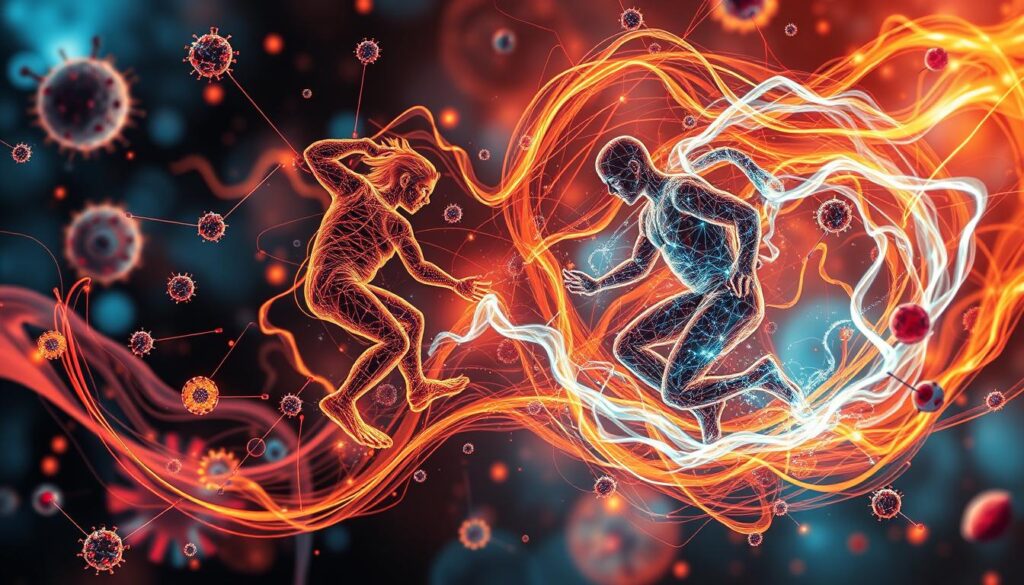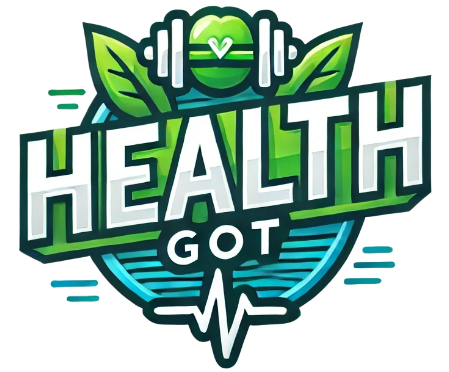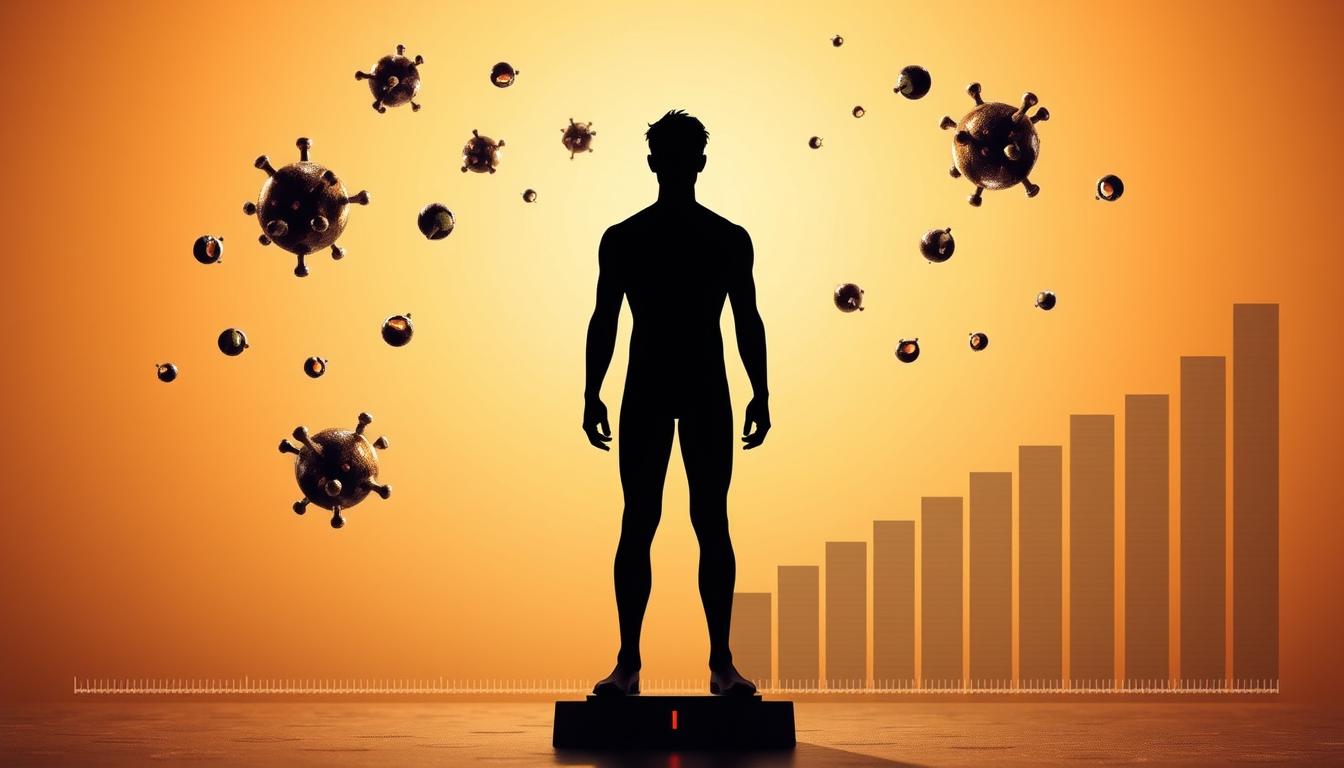Does Testosterone Make You Taller ?
As a teenager , I remember the excitement of growing taller. I wondered if I’d finally be taller than my peers. The link between this vital hormone and height is something many of us are curious about. Let’s dive into how this hormone affects our growth.
Table of Contents
Key Takeaways:
- Testosterone levels surge during puberty, contributing to growth spurts and physical changes.
- Testosterone interacts with growth hormone to stimulate bone growth and development.
- Factors like age, nutrition, and physical activity influence growth hormone secretion and height.
- Testosterone treatment can increase height velocity in adolescents with certain growth delays.
- Optimizing lifestyle factors, such as diet and exercise, boost androgen levels naturally.
Understanding Testosterone and Its Basic Functions
androgens like this are key hormones in the human body. It’s mainly made in the testes and ovaries, with some from the adrenal glands. This hormone is controlled by the hypothalamic-pituitary-gonadal axis.
Production and Regulation in the Body
The production and regulation of this male-associated hormone is complex. The brain’s hypothalamus sends out a hormone called GnRH. This hormone makes the pituitary gland release LH and FSH. These hormones then tell the testes or ovaries to make testosterone.
Normal Testosterone Levels by Age
hormone levels fluctuate as we age. They usually reach their highest during puberty and then start to go down. Here’s what normal testosterone levels are like at different ages:
| Age Range | Average Testosterone Level (ng/dL) |
|---|---|
| Infant (birth to 1 year) | 75-400 |
| Child (1-12 years) | |
| Adolescent (13-19 years) | 300-1,200 |
| Adult (20-39 years) | 264-916 |
| Middle-aged (40-59 years) | 208-746 |
| Older Adult (60+ years) | 87-570 |
Key Functions Beyond Growth
Ndrogens contribute to more than growth alone.. It’s also important for other health areas. These include:
- Reproductive tissue development and function
- Regulation of secondary sexual characteristics
- Maintenance of bone health and muscle mass
- Distribution of fat in the body
- Sexual function and libido
- Mood regulation and energy levels
Scientifically there is a lot of growth and development involved in humans.
Growth of human beings is a process too, and a complex one. This Process takes place with help of many delivery hormones. There are players involved namely (growth hormone) GH and (insulin-like growth factor 1) IGF-1. GH is produced in the pituitary gland and signals to the liver to produce IGF-1. IGF-1 takes the process a step further, promoting tissue growth throughout the body — notably at bone growth plates.
At the ends of long bones are growth plates. They help us grow taller. These plates close as we mature, and keep our growth in check. During puberty the secretion of testosterone leads to toning during growth so hormonal imbalance has an essential role.
Many other factors influence growth such as our diets, exercise levels, and sleep. A good diet, appropriate exercise and plenty of rest allow the body to grow naturally.
By studying growth and development, we can maximize our height. What you need to know is about growth hormone and IGF-1 and how they work in relation to what we do with our lives. This lets us make decisions that sustain healthy expansion.
“The process of human growth and development is a delicate dance, where hormones, genetics, and environmental factors all play a crucial role in shaping our stature.”
In the next parts, we’ll look closer at how testosterone affects height. We’ll also talk about ways to help our bodies grow as much as possible.
Does Testosterone Make You Taller? Scientific Evidence
Testosterone’s effect on height is complex. It helps with the growth spurt in puberty but also closes growth plates early. This can limit how tall you can grow as an adult. Understanding how testosterone, growth hormone, and bones work together is key.
Direct Effects on Bone Growth
Testosterone directly helps bones grow and get stronger. It makes osteoblasts, the bone-building cells, work harder. But, it also closes growth plates faster. This means your body stops growing taller sooner.
Interaction with Growth Hormone
Key hormones like this one work together with growth hormone in growth and development. Testosterone makes more growth hormone, which helps with growth. But, testosterone’s effect on closing growth plates might limit how tall you can get.
Impact on Growth Plates
The timing of hormonal shifts in puberty is very important for height. It helps bones grow but also closes them faster. People who start puberty earlier might grow shorter because their plates close sooner.
“Testosterone therapy aims to restore testosterone to normal levels but does not contribute to an increase in height beyond what would have been achieved during natural growth phases in adolescence.”
Growth Hormone and Testosterone Interaction
How Does Testosterone Make You Taller
The interaction between growth hormone and testosterone is key for growth and development. Testosterone boosts growth hormone levels and its effects on bones. This teamwork is vital during puberty, when both hormones surge, leading to big changes in body and height.
Testosterone triggers growth hormone production, which then releases insulin-like growth factor-1 (IGF-1). This chain of hormones is vital for bone, muscle, and tissue growth. The right balance and timing of these hormones greatly affect how tall someone can grow.
| Hormone | Role in Growth |
|---|---|
| Growth Hormone | Stimulates the production of IGF-1, which directly promotes bone growth and development. |
| Testosterone | Enhances growth hormone secretion and amplifies its effects on tissues, particularly during puberty. |
| Estrogen | Essential for growth spurt and signals the closure of growth plates, playing a crucial role in bone growth. |
The complex hormonal interplay in growth between growth hormone and growth hormone testosterone synergy is crucial for final height. Keeping these hormones in balance at different life stages is essential for the best growth and development.
“The delicate balance and optimal timing of hormonal increases significantly impact an individual’s final height attainment.”

Timing and Puberty: Critical Periods for Height Development
The timing of puberty is key to your final height. Both early and late puberty can affect your growth. Knowing the stages and timelines can help you reach your height potential.
Early vs. Late Puberty Effects
Early puberty means your growth period is shorter. This is because your bones stop growing sooner. Late puberty, however, can give you more time to grow, possibly leading to more height.
Growth Plate Closure Timeline
The growth plates at the ends of your bones drive your height. These plates usually close between 14 and 19 for males. Once they close, you can’t grow taller naturally.
Optimal Age for Growth Intervention
The best time for growth interventions is before or during early puberty. This is when your growth plates are open and can respond to height-influencing factors. This includes puberty timing, growth plate closure, and optimal growth intervention age.
Finding the right age for growth intervention varies for everyone. It’s crucial to work with your healthcare provider to find the best timing and approach for you.
Testosterone Treatment and Height Effects in Adolescence
Testosterone treatment in teens can greatly affect their height. Research shows that transgender boys on testosterone can grow to be as tall or taller than expected. This is after they stop growing before starting treatment.
The impact of testosterone on height depends on when treatment starts. Starting early means more growth. This is because bones keep growing longer.
“The effect of timing of treatment initiation on growth was highlighted in terms of achieving maximal growth and the impact on adult height.”
But, testosterone won’t help after bones stop growing. This usually happens after puberty. So, the best time for treatment is during the teen years.
Other things like diet, exercise, and health also matter for growth. Hormones are important, but overall health is key too.
Doctors use tests to check growth and hormone levels. This helps decide when and how much testosterone to use. It aims to reach the best height possible.

In short, testosterone can help teens grow taller, especially if started early. But, it’s important to think about overall health and when treatment starts. This ensures the best results.
Natural Ways to Optimize Testosterone for Growth
Understanding how to naturally boost your testosterone levels can change your growth journey. Testosterone is key for growth, muscle building, and health. There are natural ways to increase your natural testosterone boosters and support your growth.
Dietary Considerations
Your diet for testosterone greatly affects your levels. Eat foods high in zinc, vitamin D, and healthy fats. For example:
- Oysters, beef, and nuts for zinc
- Fatty fish, egg yolks, and sunlight for vitamin D
- Avocados, olive oil, and nuts for healthy fats
These nutrients are important for making testosterone and can naturally improve your hormone levels.
Exercise and Physical Activity
what is the best sport to grow and Does Testosterone Make You Taller?
Regular exercise for testosterone boosts your levels. Do resistance training like weightlifting or bodyweight exercises. High-intensity interval training (HIIT) and cardio also help increase testosterone.
Sleep and Lifestyle Factors
Good sleep and stress management are key for healthy testosterone. Aim for 7-9 hours of sleep each night. Stress can harm hormone production. Use relaxation techniques or mindfulness to balance your hormones.
By adding these natural strategies to your life, you can actively improve your natural testosterone boosters. Remember, being consistent and patient is important for your body’s hormonal balance.
Potential Risks and Considerations
Testosterone therapy can help with growth and height. But, there are risks to think about. Too early or too much testosterone can stop your height from growing. It might also affect your fertility, cause acne, and change your mood.
Growth hormone therapy has its own risks. It should only be used under a doctor’s watchful eye. Using growth hormones wrong can lead to serious side effects. Always follow your doctor’s advice.
Deciding on testosterone or growth hormone therapy is big. Talk it over with your doctor carefully. Know the risks and benefits. This way, you can choose what’s best for you.
FAQ
Does testosterone make you taller?
How does testosterone affect growth and development?
Can testosterone treatment increase height in adolescents?
What are natural ways to optimize testosterone for growth?
How does the timing of puberty affect height?
Source Links
- Can Testosterone Make You Taller? – https://hrtdoctorsgroup.com/can-testosterone-make-you-taller/
- Testosterone Therapy Improves the First Year Height Velocity in Adolescent Boys with Constitutional Delay of Growth and Puberty – https://pmc.ncbi.nlm.nih.gov/articles/PMC5556315/
- Testosterone: What It Is, Function & Levels – https://my.clevelandclinic.org/health/articles/24101-testosterone
- Exercise And Testosterone: What Is The Connection? – https://www.liferxpharmacy.com/blog/exercise-and-testosterone/?srsltid=AfmBOoq6d3ZhfiqNcQG6hFthK7B37Jy-nXIXIMKrMQoHLB3qDWiC8S1y
- How to increase height: Factors that influence growth – https://www.medicalnewstoday.com/articles/327514
- Growth hormone significantly increases the adult height of children with idiopathic short stature: comparison of subgroups and benefit – https://pmc.ncbi.nlm.nih.gov/articles/PMC4114101/
- Does Testosterone Make You Taller? Unraveling the Myths with AlphaMD | Alpha MD – https://www.alphamd.org/resources/does-testosterone-make-you-taller-unraveling-the-myths-with-alphamd
- Can Testosterone Make You Taller? – https://empowermensclinic.com/can-testosterone-make-you-taller/
- Can Height Be Increased After 25? | HealthGAINS – https://healthgains.com/hormone-therapy/hgh-growth-hormone-therapy/can-height-be-increased-after-25/
- Height Secrets Or A Myth? – https://www.pathmed.com/does-testosterone-make-you-taller/
- Just as Tall on Testosterone; a Neutral to Positive Effect on Adult Height of GnRHa and Testosterone in Trans Boys – https://pmc.ncbi.nlm.nih.gov/articles/PMC9844962/
- Puberty: MedlinePlus – https://medlineplus.gov/puberty.html
- All About Puberty (for Kids) – https://kidshealth.org/en/kids/puberty.html
- how can Testosterone Make You Taller? – https://www.ultalabtests.com/blog/hormone/does-testosterone-make-you-taller/?srsltid=AfmBOoroj4jL83rQw_lpvjRilvFixstbSlydhQTv-J1K9wQgT-G48upc
- Testosterone Use in Adolescent Males: Current Practice and Unmet Needs – https://academic.oup.com/jes/article/5/1/bvaa161/5943483
- 10 Ways to Boost Human Growth Hormone (HGH) Naturally – https://www.healthline.com/nutrition/11-ways-to-increase-hgh
- How to increase testosterone during puberty – https://www.singlecare.com/blog/low-testosterone-during-puberty/
- Growth, growth potential, and influences on adult height in the transgender and gender‐diverse population – https://pmc.ncbi.nlm.nih.gov/articles/PMC9135059/
- Testosterone Use in Adolescent Males: Current Practice and Unmet Needs – https://pmc.ncbi.nlm.nih.gov/articles/PMC7705876/
- Just as Tall on Testosterone; a Neutral to Positive Effect on Adult Height of GnRHa and Testosterone in Trans Boys – https://academic.oup.com/jcem/article/108/2/414/6747528


1 thought on “Does Testosterone Make You Taller Instantly ?”
Comments are closed.